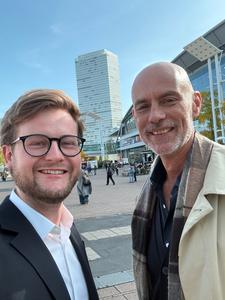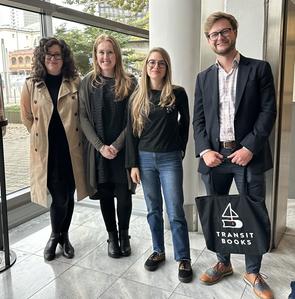 Spencer Ruchti is the author events manager for Third Place Books in Seattle, Wash., and the co-founder of the Cercador Prize for Literature in Translation with Justin Walls. He attended the Frankfurt Book Fair thanks to a fellowship from Books Across Borders, a nonprofit organization that aims to connect booksellers to the international world of publishing. Here is his report:
Spencer Ruchti is the author events manager for Third Place Books in Seattle, Wash., and the co-founder of the Cercador Prize for Literature in Translation with Justin Walls. He attended the Frankfurt Book Fair thanks to a fellowship from Books Across Borders, a nonprofit organization that aims to connect booksellers to the international world of publishing. Here is his report:

|
|
| Spencer Ruchti (l.) with Europa Editions' Michael Reynolds, founder of Books Across Borders. | |
Even when I didn't speak the language, let alone share a common border, literature was enough. At one of the largest book fairs in the world, I could talk enthusiastically with booksellers from Spain about Sara Mesa or Enrique Vila-Matas, trade stories about Mircea Cărtărescu with a Romanian bookseller, or share my admiration for the late Dubravka Ugrešić with a publisher from Amsterdam. I met a Dutch bookseller, the founder of a Black-owned bookstore in Rotterdam, who loved and admired Astrid Roemer, whose books I knew thanks to Two Lines Press. My German was poor, but everyone I met had authors (and their books) in common.
More than 114,000 trade attendees and 150 countries were represented at the Frankfurter Buchmesse this year, where editors, scouts, agents, and experts in foreign rights took meetings ad nauseam, with hardly a minute to spare for the restroom. In the German hall, I overheard publishing professionals discussing the rise of English-language imports in the European market. Thanks in large part to social media, European consumers, particularly in Germany, have flocked to U.K. editions of commercial titles rather than reading in translation. Booksellers have adapted by dedicating more square footage to English-language books. The fear, of course, is that young readers in some European countries are neglecting their region's language and rich tradition of literature.
I found not one, but two of my fellow Seattleites in attendance--Washington State's former poet laureate Claudia Castro Luna and my friend Rick Simonson of Elliott Bay Book Company. After hours, I met a retiring German editor who about visiting one of his American authors, James Lee Burke, at the author's home in Missoula, Mont. His one regret was that they never went flyfishing. At a late-night dance party hosted by Canongate Books, I (literally) brushed elbows with current and former publishing executives and editors of some of my favorite nonprofit publishers. All were equalized on the dance floor, in part because we were all terrible dancers.
During the fair, Julie Belgrado, director of the European & International Booksellers Federation (EIBF), unveiled findings from a new report, Study on Consumer Behavior: Book-buying Trends, Reading Habits, and Customer Needs , that surveyed 9,500 consumers in 19 countries. (For the Shelf Awareness report on the study, click here.)
Among the findings: 31% of U.S. adults consider reading a hobby, compared to an average 34% internationally, and 51% of Americans say they shop at bookstores because of the "enjoyable atmosphere," compared to only 40% internationally. Belgrado emphasized key takeaways from the study: we need more data about reading as a hobby. Governments and trade associations should do more to invest in early childhood reading and fight for literacy efforts in policymaking.
 |
|
| Spencer Ruchti (r.) with the three booksellers who participated in the Frankfurt edition of the RISE Booksellers Exchange Programme: (from l.) Lexie Eatock, Better Read Than Dead, Newtown, Australia; Gabrielle West, McLeods Booksellers, Rotorua, New Zealand; and Isabella Creţan, Cărturesti, Timisoara, Romania. | |
For a panel titled "Booksellers of the Future: Ideas and Projects for the Training of European Booksellers," the EIBF's policy assistant Lorenzo Dall'Omo moderated a conversation between experts on vocational schools for booksellers in Germany and Italy. During these two- to three-year trade programs, booksellers-in-training are taught inventory purchasing, accounting, cash flow, marketing and inventory management, and the benefits (tangible or intangible) of hosting author readings and how to make them profitable. These programs work in conjunction with a Chamber of Commerce or other government entity, depending on the country. Booksellers also visit wholesalers and learn about consumer habits and trends in a dynamic industry--lately, this includes an introduction to the sway of influencers on reading culture (16-24-year-olds are the fastest growing demographic of readers in Europe), and how AI may one day assist booksellers with accounting, returns, and drafting purchase orders for daily reorders. (As one German official said, regarding both influencers and AI: "Eventually our enemies become our resources.") In communities abroad, booksellers are cultural figures who initiate events and meetings amongst cultural dignitaries.
Independent booksellers largely don't attend international trade shows, for reasons that might make sense at first glance. We have no title rights to buy or sell. Both the sales data and lived experience we have to offer are fractured and inconsistent, hyper-local to a single region, city, or neighborhood. But as Will Evans, founder of Deep Vellum Bookstore & Publishing, once told the New York Times, "Seeing the local as part of the international is something that is unique to what we're doing.... The more local we get, the more it allows us to branch out and bring the world to us." Organizations like Books Across Borders and RISE Bookselling in the EU are making efforts to bring more booksellers into the conversation, with the knowledge that booksellers are some of the few workers in the book publication circuit who interface daily with readers. This alone, I believe, makes booksellers worthy of participating in the international complex of literature.

